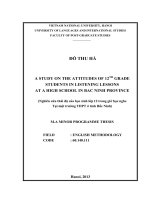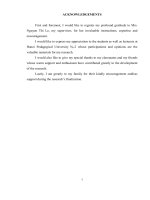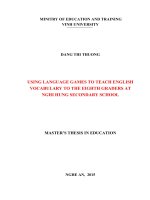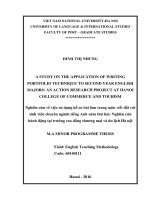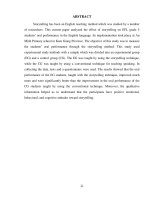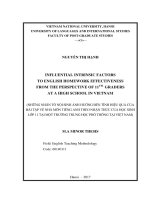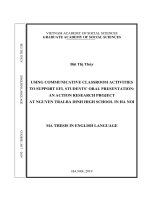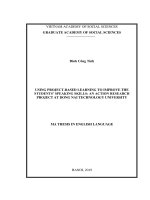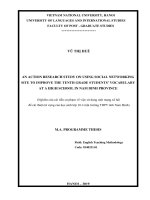An action research project on the employment of language games to enrich english vocabulary for the 3rd graders at a primary school in thai nguyen province
Bạn đang xem bản rút gọn của tài liệu. Xem và tải ngay bản đầy đủ của tài liệu tại đây (1.22 MB, 64 trang )
THAI NGUYEN UNIVERSITY
SCHOOL OF FOREIGN LANGUAGES
---------- ----------
MA THI LINH
AN ACTION RESEARCH PROJECT ON THE
EMPLOYMENT OF LANGUAGE GAMES TO ENRICH
ENGLISH VOCABULARY FOR THE 3RD GRADERS AT A
PRIMARY SCHOOL IN THAI NGUYEN PROVINCE
M.A THESIS
Field: English Linguistics
Code: 8220201
THÁI NGUYÊN - 2020
ĐẠI HỌC THÁI NGUYÊN
TRƯỜNG NGOẠI NGỮ
---------- ----------
MA THỊ LINH
NGHIÊN CỨU HÀNH ĐỘNG VỀ VIỆC ÁP DỤNG CÁC
TRỊ CHƠI NGƠN NGỮ TRONG MỞ RỘNG TỪ VỰNG
TIẾNG ANH CHO HỌC SINH LỚP 3 TẠI MỘT
TRƯỜNG TIỂU HỌC Ở THÁI NGUYÊN
LUẬN VĂN THẠC SĨ
Ngành: Ngôn ngữ tiếng Anh
Mã số: 8220201
THÁI NGUYÊN - 2020
DECLARATION
I hereby certify that the thesis entitled “An action research project on the
employment of language games to enrich English vocabulary for the 3rd
graders at a primary school in Thai Nguyen Province” is the study of my own
research and the substance of this research has not been submitted for a degree to
any other university or institution.
Thai Nguyen, November 2020
Approved by Supervisor
Signature
Dr. Nguyen Thu Hanh
Ma Thi Linh
i
ACKNOWLEDGEMENTS
This study cannot be completed without the help of many people. Therefore,
I would like to show my great thanks to those for their great support and
encouragement throughout the realization of this thesis.
First of all, I would like to express my deepest gratitude to my beloved
supervisor, Dr. Nguyen Thu Hanh for her valuable assistance, considerable
encouragement and awesome inspiration she transferred me during the time this
research conducted.
Besides, I would like to express my gratitude to all my lecturers and staffs at
School of Foreign Languages-Thai Nguyen University whose support and
consideration have enabled me to pursue the course.
Furthermore, I would also like to express my sincere thanks to teachers and
all students at Trung Hoi Primary School for their cooperation to participate in the
research.
Last but not least, I owe a big thank to my parents who have always
encouraged me to complete this study.
ii
ABSTRACT
Learning English is a challenging task for students in Vietnam. It is much
more difficult for students in mountainous areas in general and in Trung Hoi in
particular because most of them are from ethnic minorities, they do not have good
oppotunities to study as the ones in the big cities. The basic level in teaching
English is how students can retain English vocabulary and use them to
communicate in English environment. Therefore, teachers need to design the
lessons to be intersting and suitable for students here. Among effective English
teaching methods, using games is studied that it can help students enhance their
vocabulary attention. This research is going to conducted on techniques of using
games in teaching English vocabulary for primary school students. Through finding
the answers of the research questions, the researcher can find out effectiveness of
using game techniques in teaching English vocabulary for primary school students.
Its results are hoped to be helpful reference for futher researches, as well as for
teachers who desire to help students in studying English.
Keywords: Language Games, Vocabulary, Teaching, Action Research
iii
TABLES CONTENTS
DECLARATION ......................................................................................................... i
ABSTRACT .............................................................................................................. iii
TABLES CONTENTS ............................................................................................... iv
LIST OF TABLES, FIGURES .................................................................................. vi
CHAPTER 1: INTRODUCTION ............................................................................ 1
1.1. Rationale of the research .................................................................................. 1
1.2. Aims and objectives of the research ................................................................. 2
1.3. Research questions ............................................................................................ 3
1.4. Scope of the research ........................................................................................ 3
1.5. Method of the research ..................................................................................... 3
1.6. Significance of the research .............................................................................. 4
1.7. Thesis organization ........................................................................................... 4
CHAPTER 2: LITERATURE REVIEW ................................................................ 5
2.1. Overview of vocabulary and vocabulary teaching and learning ...................... 5
2.1.1 Definition of vocabulary ............................................................................. 5
2.1.2. Aspect of vocabulary .................................................................................. 6
2.1.3. Types of vocabulary ................................................................................... 7
2.1.4. Vocabulary knowledge ............................................................................... 7
2.1.5. Teaching and learning vocabulary ............................................................. 8
2.2. Games in vocabulary teaching and learning ..................................................... 8
2.2.1. Games in teaching and learning English .................................................... 8
2.2.2. Games in teaching English vocabulary .................................................... 10
2.2.3. Steps of teaching English vocabulary through games .............................. 12
2.3. Previous studies .............................................................................................. 14
Summary ................................................................................................................ 18
CHAPTER 3: METHODOLOGY ......................................................................... 19
3.1. Design of the study ......................................................................................... 19
3.2. Setting of the study ......................................................................................... 21
3.3. Suggested games applied in the current study ................................................ 21
iv
3.4. Action research procedure .............................................................................. 27
3.4.1. Warming up .............................................................................................. 27
3.4.2. Presentation .............................................................................................. 28
3.4.3. Explanation ............................................................................................... 28
3.4.4. Production ................................................................................................ 29
3.5. Data collection instruments ............................................................................ 29
3.6. Data analytical method ................................................................................... 30
Summary ................................................................................................................ 31
CHAPTER 4: FINDING AND DISCUSSION ..................................................... 32
4.1. Findings from observation .............................................................................. 32
4.1.1. Pre-observation results ............................................................................. 32
4.1.2. Post-observation results ............................................................................ 33
4.2. Findings from tests ......................................................................................... 34
4.2.1. Pre-test results .......................................................................................... 34
4.2.2. Post-test results ......................................................................................... 35
4.2.3. Differences in students’ vocabulary use before and after using
language games in teaching vocabulary ............................................................. 36
4.3. Findings from interviews ................................................................................ 36
4.3.1. Interviews with teachers ........................................................................... 36
4.3.2. Interviews with students ........................................................................... 37
4.4. Discussion ....................................................................................................... 38
Summary ................................................................................................................ 39
CHAPTER 5: CONCLUSION ............................................................................... 40
5.1. Recapulation ................................................................................................... 40
5.2. Implications .................................................................................................... 40
5.3. Limitations of the research ............................................................................. 41
5.4. Suggestion for further studies ......................................................................... 42
REFERENCES ........................................................................................................ 43
APPENDICES ........................................................................................................... I
v
LIST OF TABLES, FIGURES
TABLES
Table 4.1:
The overall descriptive data of the tests .............................................36
FIGURES
Figure 3.1:
Steps in the action research cycle (Kemmis & Mc Taggart, 1998) ....20
Figure 4.1:
Pre-test outcome .................................................................................34
Figure 4.2:
Post-test outcome................................................................................35
vi
CHAPTER 1
INTRODUCTION
1.1. Rationale of the research
Currently, English is seen as a compulsory subject at schools in Vietnam. It is
no longer new and strange for students, this subject has received the attention of
parents and students. English is also a subject for students to love, explore, compare
the differences between languages, learn about the cultures, people and socioeconomy of the country that children are studying. In recent years, the current
requirements of education require innovation in teaching methods at all subjects and
levels, in order to improve the quality of teaching and learning. Therefore, English
subject in general and English subject in elementary school in particular also need
to have more powerful innovation, promote positive, proactive creativity of
students, student-centered. Vocabulary plays a crucial role in everyday as well as
academic communication. Its significance is evident even in the initial stages of
second language learning process. In this way, vocabulary is one of the core
elements of language aptitude and reflects how well learners listen, speak, read and
write. Language ability of learners can be improved by vocabulary improvement.
The importance of the methods of vocabulary acquisition is increasing day by day
as vocabulary learning is often considered a laborious and monotonous process.
However, various approaches have been introduced in helping second language
learners develop and learn vocabulary, i.e. reading books, newspapers, playing
games, watching foreign cartoons or films with subtitles, listening to foreign music
At Trung Hoi Primary School, students start learning English at grade of 3.
Most of students are ethnic minorities and their mother tongue is Tay, Nung, Dao
language. They sometimes have difficulties in Vietnamese speaking. Therefore,
English is seen as challenges for them. Besides, there are still a few students who
are not aware of the importance of the subject in life so they are not interested in
learning this subject. Moreover, students here do not have chances to study English
with native speakers, or buy modern equipment such as a radio, a computer or even
books except their text books of English at school. As a result, English teachers here
1
must find out the method to teach English so that it can encourage the students to
study and help them intend knowledge effectively.
In order to give students a passionate spirit of learning English, it is necessary
to give them a vibrant learning environment, the teaching method of teachers must
always be innovative, scientific and effective. Therefore, playing the role of a
teacher, I always look for the most appropriate method to apply in the lesson,
helping the learner to quickly memorize the lesson well and especially the passion
for with the subject. Teachers must inspire students’ learning by engaging them in
learning activities. Inspiring them is giving them confidence in the subject, as well
as confidence in their language skills, so that they can learn English well.
I myself always explore and learn through colleagues, through the media,
through many different resources to be able to find many interesting teaching
methods, especially methods for elementary school students because their
knowledge acquisition is limited. In teaching progress with a great number of
students, I realize that creating a passion for them is indispensable for elementary
students because they are just acquainted with English, familiar with simple
sentences and they learn English well if they find it enjoyable.
Using games for teaching and learning vocabulary is very popular in many
countries of the world. The game has rich content, uses interesting and useful
language to suit their perception. Through the games, they will acquire knowledge
and ability to use language in communication easily, consolidate and inculcate
knowledge firmly, giving them passion and excitement. in studying, in employment.
When we offer games in English lessons on a regular and scientific basis, the
quality of teaching English will surely increase. Because of these reasons, I chose
the research topic “An action research project on the employment of language
games to enrich English vocabulary for the 3 graders at a primary school in Thai
Nguyen province”
1.2. Aims and objectives of the research
Firstly, the study aims to investigate the attitudes of teachers and students
toward using game techniques in vocabulary lessons. Secondly, the reseacher wants
2
to study on how much game techniques can help primary school students enrich
their English vocabulary. Thirdly, the research’s goal is to give recommendations
for teachers and students to overcome the vocabulary-related problems.
Assessing the effectiveness of learning vocabulary through games in the
classroom, we want to know how students’ experiences help with their learning and
what progress they gain, specifically, whether we can apply games as an effective
means to make students feel more comfortable and interested in learning English
vocabulary.
The results of this study, hopefully, will improve students’ vocabulary learning and
retention. It is also for teachers to employ language games into their teaching.
1.3. Research questions
This paper is going to find the answers of the following questions:
1. What are the Trung Hoi Primary School students and teachers’ attitudes
towards the employment of language games
in teaching and learning English
vocabulary?
2. To what extent does the employment of language games affect the students’
learning English vocabulary?
1.4. Scope of the research
This study only focuses on the actual situations related to using language
games to enhance English vocabulary of the 3rd graders at Trung Hoi Primary
School, Dinh Hoa District, Thai Nguyen Province. Because of limited time, the
research cannot cover all students at grade three and all lesson in the second
semester. It is only conducted with 60 students in Class 3A and 3B in English
vocabulary lessons.
1.5. Method of the research
The main method of the research is action research. The term “action
research” refers to two dimensions of activity: the word “research” refers to a
systematic approach to carrying out investigations and collecting information that is
designed to illuminate an issue or problem and to improve classroom practice,
meanwhile the word “action” refers to taking practical action to resolve classroom
3
problems (Richards, 2005). Therefore, action research achieves both action (change
or improve) and research (understanding).
According to Cohen et al. (2007), action research is “small-scale intervention
in the functioning of the real world and a close examination of the effects of such
intervention”. Kemmis and Mc Taggart (1988) identify three characteristics of an
action research, which are “carried out by practitioners”, “collaborative” and
“aimed at changing things”.
1.6. Significance of the research
Through finding the answers of the research questions, the researcher can find
out effectiveness of using game techniques in teaching English vocabulary for
primary school students. Its results are hoped to be helpful reference for futher
researches, as well as for teachers who desire to help students in studying English.
1.7. Thesis organization
There are five chapters in this thesis:
Chapter 1: Introduction - In this part, rationale, aims, objectives, research
questions, scope, significance and organization of the study will be clarified.
Chapter 2: Literature Review - This part supplies scientific base of the
study, as well as previous researches which help this study have a firm foundation
and well-directed approaches.
Chapter 3: Research Methodology - This chapter shows context of the
research and methodologies applied to get data, analyze data to find out results.
Chapter 4: Findings and Discussions -Based on methodologies, this study
will find out the answer of the research and then discuss them.
Chapter 5: Conclusion - This last part will summarize all the advantages and
drawbacks of using game techniques in teaching English vocabulary. It also talks
about achievements and limitations of the research, which helps further researches
in the future.
References and Appendices are shown on the final pages of the research.
In summary, this chapter provided the overview of the study including
rationales of the study, aims of the study, research questions, scope of the study,
significance of the study, and design of the study. The following chapter will
present the theoretical framework of the study.
4
CHAPTER 2
LITERATURE REVIEW
This chapter shows the theoretical background of the research. First of all,
theories of vocabulary, teaching vocabulary and games in teaching are discussed.
Then, it is going to mention to the studies related to teaching English vocabulary
through games.
2.1. Overview of vocabulary and vocabulary teaching and learning
2.1.1 Definition of vocabulary
There is one claim that “If language structure makes up the skeleton of
language, then it is vocabulary that provides the vital organs and flesh,” (Hammer,
1991, p. 153). While it may be difficult to understand a sentence with grammatical
errors, it is impossible to convey anything without accurate vocabulary. However,
language ability of students can be reasonably improved by vocabulary
enhancement. Learning the exact vocabulary is very significant for fluency than
learning grammar of the target language.
Vocabulary plays an extremely important in any language. There are various
definitions of vocabulary proposed by linguists. According to Hatch and Brown
(1995), vocabulary refers to a list or set of words for a particular language or a list
or set of words that individual speakers of language might use. Hornby (1995) states
a detailed definition of vocabulary, which includes the total number of the words
which make up a language, all the words known to a person or used in a particular
book, subject, etc; and a list of words with their meaning.
From the definitions above, it can be concluded that vocabulary is all words
of a language that an individual can use in communication.
Traditionally, vocabulary has not been a particular subject for students to
learn, but has been taught within lessons of speaking, listening, reading and writing.
During the lesson, students use their own vocabulary and are introduced to new
words provided by the teacher and classmates which they apply to classroom
activities. For many learners of English, whenever they think of vocabulary, they
think of learning a list of new words with meanings in their native language without
5
any real context practice. A number of learners may share the same experience of
looking up words in a bilingual dictionary to find their meanings or definitions
when they encounter new words. They may even write down lines of new words
without any idea of the real use of them in context. Working this way, after a short
period of time, many learners may find out that learning vocabulary in lists does not
satisfy themselves, and they think the cause for it is just their bad memorization,
Gnoinska (1998:12). Research and publications have shown that this is not a very
effective way to study. Decarrico (2001) stated that words should not be learned
separately or by memorization without understanding. Moreover, "learning new
words is a cumulative process, with words enriched and established as they are met
again", Nation (2000, p.6). Therefore, the "look and remember" way of vocabulary
learning seems to be not very effective for learners of the English language.
Furthermore, some other students may require teachers to give meaning and
grammatical function for words that they are not familiar. Learners just wait for
teachers who control the lesson to provide new forms of words then they write those
words in their notebooks or complete their exercises. They may use words they
learn in the exact formats as the original patterns in which those words appeared.
This kind of rote verbal memorization is good to a certain extent since it helps
learners learn and use the correct form of words. However, according to Decarrico
(2001), the vocabulary used in such context is rather simple because grammatical
and phonologic aspects are emphasized; and as a result, the lexical aspect is
neglected. In other words, learners just know how to use the vocabulary in an exact
form, but they do not know how to use it with different shades of meanings in real
life communication.
2.1.2. Aspect of vocabulary
There are several aspects of vocabulary which should be known by the
students. According to Qian (2005, p. 35), “The dimension of depth of vocabulary
knowledge comprises various aspect of lexical characteristics such as phonemic,
graphemic, morphemic, syntactic, semantic, collocational, and phraseological
properties. Then Ur (1999, p. 60-62), states that “The aspect which needed to be
6
taught such as form (pronunciation and spelling), grammar, collation, aspects of
meaning (denotation, connotation, appropriateness), aspect of meaning (meaning
relationship), and word formation.
2.1.3. Types of vocabulary
Stephard in Setiwan (2012, p.12) classified vocabulary into two kinds: a
receptive vocabulary and productive vocabulary. The receptive vocabulary is also
called a passive process because the learner only receives thought from others. In
language application, the receptive vocabulary is considered as the basic
vocabulary. Meanwhile, the productive vocabulary is defined as the words used
when the learner speaks and writes.
Furthermore, Haycraft (1978, p.44) divided two kinds of vocabulary, namely
receptive and productive vocabulary. Receptive vocabulary is the words that the
students recognizes and understands when they occur in context, but which he or
she cannot produce correctly himself or herself. Meanwhile, the productive
vocabulary is the words which the student understands, can pronounce correctly and
uses constructively in speaking and writing.
2.1.4. Vocabulary knowledge
Vocabulary is one of the most important factors of English. It is considered as
the most important one for learners in learning English as a foreign language.
Because of their limited vocabulary, they cannot communicate their ideas
transmitted to them (Nunan, 1992). Students must acquire vocabulary skill in order
to get other abilities like listening, speaking, reading, and writing. In other words,
vocabulary skill takes an important role in understanding the four basic skills of
English. In relation to the teaching learning of the four skills of English, vocabulary
is an inseparable part of any language learning. It should be described, taught,
included in all kinds of language learning activities and must be learnt by students.
It would be impossible to learn a language without vocabulary.
Vocabulary proficiency would be very helpful for the students in learning
English, especially in spoken skill.
7
2.1.5. Teaching and learning vocabulary
Bera (2016) studied the strategy of using context and motivating students to
help them remember and apply their vocabulary better; Or, assigning exercises
based on students' different cognitive abilities and understandings are suggested as a
way to promote learning and pay more attention to their vocabulary.
Mohamed (2017) and his colleagues pointed out seven vocabulary learning
strategies (tested), including cognition, guessing meanings, using dictionaries,
taking notes, repeating words, decoding and applying vocabulary in learning
process, practice using language. As a result, students have had ways to apply the
above strategies; however, do not employ a combination of strategies to achieve the
highest results. In addition, there are many other studies which indicate that learning
vocabulary should be through communication activities, reading extended
documents in addition to textbooks, and vocabulary translation methods. They are
to explain the meaning of words and teaching the meaning of words, encouraging
learners to raise awareness and use metaphors, metaphors in the language, learn
words by phrases instead of studying by every single word.
Being aware of the importance of teaching and learning vocabulary, the
researcher decided to choose the topic which is related to vocabulary and wanted to
apply effectively games in teaching new words in Dinh Hoa Primary School.
2.2. Games in vocabulary teaching and learning
2.2.1. Games in teaching and learning English
Games are fun activities that promote interaction, thinking, learning, and
problem solving strategies either a game is a system in which players engage in an
artificial conflict, defined by rules, that results in a quantify able outcome.
“Games are effective tools for learning because they offer students a
hypothetical environment in which they can explore alternative decisions without
the risk of failure. Thought and action are combined into purposeful behavior to
accomplish a goal. Playing games teaches us how to strategize, to consider
alternatives, and to think flexibly.” (Martinson & Chu, 2008: 478)
8
The game is a natural means to understand the world around it, so it is used in
teaching and learning, including learning foreign languages. Language is a complex
system that people use to communicate or communicate with each other.
Language is the communication system used by a specific community or country,
which is the way informal mode of communication through text or words. In fact,
games and languages help enrich each other. Language game is a philosophical
concept that was mentioned by Wittgenstein since the 1930s. The language game
refers to simple examples of language use and language matching activities.
Initially, the game was metaphorical to support the concept of grammar, but
gradually it had an independent position. When the concept of language as the
action is formed then the rules of the game or the rules of the game are formed.
Being different from the concept of grammar, the concept of language game is
associated with time (the beginning and ending of the game). State-owned
organizations are also structured by principles but according to the intention of the
actioners. These rules are born right in the process of playing, in the physical
structure of the object and the social context.
Therefore, vocabulary games bring real world context into the classroom and
improve students’ level use of English language in an adaptable and appropriate
communicative way. Vocabulary learning language games help and encourage ESL
learners to sustain their interest. Games result in fun and motivation for students
making them learn new items effortlessly. Some games can be quite instructive and
enlightening. Educational language games play a vital role in learning basic
language skills. Games are a “form of play governed by rules.” However, they can
be relished only if they are entertaining. They should not turn out to be a heavy
preoccupation; rather provide a break from routine exercises, making students
utilize the language as amusement. Likewise, labels language games as a blend of
rules and fun aimed to achieve a goal. There are many types of language games that
can be used according to the level of the students.
Whereas, the students may learn language significantly and effectively via
games, positive criticisms from teachers or students can help both to adapt the
9
classroom based on needs analysis. They can measure themselves whether learning
objectives were met or not without any outside observation and input.
2.2.2. Games in teaching English vocabulary
There have been many researches about games in teaching vocabulary so far.
Lee (1979) states that language games can dispel the boredom of class time instead
of creating a fun learning environment that increases students' interest in learning,
making them always ready to join the lesson. Hadfield (1990) describes games as an
activity with rules, a goal and an element of fun.
Teaching and learning through games are aimed primarily at entertainment
and relaxation after stressful and exhausting hours for both teachers and students.
But through educational games, players can also be trained physically, train senses,
create opportunities to interact with people, and cooperate with teammates in
groups, groups etc. Classroom’s games are activities organized with the nature of
entertainment. Through educational games, students have the opportunities to study
in comfortable atmosphere. When participating in games, students will be able to
imagine and contemplate, experiment with situations, reasoning to achieve high
results. Learning games also create a joyful, innocent and lively atmosphere during
class. Helps the dry side of the learning problem be alleviated and the child's
memory becomes firmer. Help students acquire knowledge in a positive and selfconscious manner. The combination of using game forms in learning will bring high
efficiency in teaching. The learning game used will have a positive effect to change
the learning style and through the learning environment, the classroom will become
more comfortable and comfortable, the student's knowledge acquisition becomes
softer and more effective.
Games, therefore, play important roles in EFL class. In fact, in teaching and
learning foreign languages, students will learn more effectively if they are learning
in a fun, relaxing learning atmosphere and have many opportunities to communicate
in the context of the real world. The use of language games in teaching foreign
languages is one of the effective methods that can increase motivation for students.
Many language games require students to work in pairs, in groups or require
the participation of the whole class together to meet the requirements of the game,
10
and to score as many points as possible. In fact, most students like to score. At the
same time, through these games, students have a natural incentive to review what
they have learned, as well as to receive new knowledge excitedly. In addition, in
order to win the game, or to solve the problem encountered, each player must
contribute their understanding or opinion. The task of the teacher is to encourage all
students to really enjoy the game. In the relaxed, relaxed atmosphere created by the
game, real learning takes place, and learners use the languages they have learned
and practiced before.
Language games are a positive method of teaching in a learner-centered
manner. To achieve the goal of the game, each individual must communicate with
each other, that is, they must discuss in groups to find the final result. As such,
players must use language to close gaps, to present information necessary for
completing the game.
Learners will have to discuss and find solutions to achieve the purpose of the
game. This way, they have to say or write down things that express their views or to
communicate with other teams. This means that the game gives students the
opportunity to communicate with each other, even timid and lacking self-confidence
students are attracted to this type of activity. In addition, teachers no longer play a
role in controlling and controlling all classroom activities, specifically what students
have to say. In language games, they only act as instructors, organizers, game
controllers and informants. According to Rixon (1981), teachers should be there as
informants about vocabulary, about newly encountered structures, or suggestive, to
help players better understand something by other explanations are easier to
understand. In short, using games is a way to create learner-centered classroom
environments, giving students more autonomy and autonomy opportunities so they
can master themselves in social activities.
According to Yiltanlilar and Caganaga (2015), the benefits of using games
in language learning include that games are learner-focused, encourages the
creative and natural use of language, and foster participatory attitudes of the
learners. Otherwise, games also encourage learners to keep interested in the
work and a teacher can use them to create contexts in which the language is
11
used. Games encourage learners to interrelate, cooperate, to be creative in using
the language in a meaningful way. Learners want to take part in activities; to
play games and are generally ambitious. In addition, they become ejecting all
other functions of the words.
Some experts have also figured out characteristics of games that make
vocabulary learning more effectively. Lee (1995, p.35) lists several main
advantages when games are used in the classroom, including “a welcome break
from the usual routine of the language class”, “motivating and challenging” “effort
of learning”, and “language practice in the various skills”. Ersoz (2000) holds that
games are highly appreciated thanks to their amusement and interest. Teachers can
use games to help their students practice more their skills of communication. In
addition, Uberman (1998) also affirms the helpful role of games in vocabulary
teaching after quoting and analyzing different opinions of experts. From her own
teaching experiences, Uberman observed the enthusiasm of her students in learning
through games. She considers games a way to help students not only enjoy and
entertain with the language they learn, but also practice it incidentally.
In summary, games are useful and effective tools. They should be applied in
vocabulary classes. The use of vocabulary is a way to make the lessons more
interesting, enjoyable and effective. Those previous researches help the researcher
believe that games can be used in current study.
2.2.3. Steps of teaching English vocabulary through games
There are five steps in teaching vocabularies through game. First is making
motivation by greeting and doing warm-up activity. Strong motivation makes
learners be interested in language learning. Next, the presentation of vocabulary is
presented through the variety of materials such as pictures, songs or real object and
situation. The various materials can attract learners to language learning. Then, skill
practice is used for evaluating learners’ memorization and understanding. After that,
the assessment is started for checking progress of learners’ understanding. The
assignment is provided to learners as the assessment for checking progress of
learners’ understanding. The assignment can be worksheet, examination or
12
presentation by learners. Finally, teacher and learners are participation of reviewing
the lesson they have learnt.
Together with the above mentioned steps, teacher should consider the
following suggestions for using games in vocabulary teaching.
The various types of classroom activities can be applied suitably such as pair
work, small or large group work, collecting things around the room and finding
partners. The activities must not be the same (Obee, 1999). For example, a
whispering game can be played into one large group first and then, the game can be
changed into two groups and finally, the game can be applied into small groups.
Teacher can also add more word or sentence while playing game or teacher can also
applied the game into racing game. Learners’ participation is necessary. Learners
obtain more vocabularies and use them confidently through the participation of the
meaningful and different tasks based on real life context (Bogdan, 2009). For
example, instead of teacher tell learners to memorize words of fruits and vegetables,
teacher can assign learners a task of making their own Pictionary of fruits and
vegetables from supermarket’s pamphlets. Pictionary by learners let learner be
participation of language learning and supermarket’s pamphlet is from learners’
real-life and meaningful context.
The different learners take different roles of games. They can reveal different
words or meaning differently from their perspective which the other learners can
learns from those perspectives as the suggestion (Alemi, 2010). Also, personality is
the most important factor in teaching (Kumar and Lightner, 2007). For example,
when teacher asks learners to make a sentences with the word “useful”, a learner
can create many sentences from their experience such as “Electric drill is useful”
from a learner which lives in factory. Teacher may also notice learners some
awareness from learner’s mistakes such as “Milk is useful”. Teaching too many
vocabularies to learners may not the suitable way of teaching. Teaching
many words to learners by memorizing at the beginning of the lesson may not the
suitable way of teaching because learners can’t use language although they can
memorize a lot of words. The main purpose of language learning is to use language
13
correctly. So learning vocabulary in a form of sentences and/or pictures can be more
effective (Jitmuad, 2005).
Classroom management can facilitate environment and conduct classroom to
learning. Clear rules at first, appropriate and inappropriate concept in class, reward
offering and enough activities are the elements of the classroom management which
can control classroom easier (Linse, 2006). For example, when the class begins,
teacher asks learners to rearrange their chairs into groups of four or five at first
because the games need to be used a group of four or five learners. Then, teacher
tells and reviews the playing rules clearly before playing games. After the game
finishes, teacher give a reward appropriately to the winner. These can facilitate your
class and your game easier; otherwise, the game may not be successful.
2.3. Previous studies
The present paper intends to represent a few examples from the literature
concerned with the use of vocabulary games in learning the target words. For
example, Riahipour and Saba (2012) mentioned that traditional activities such as
memorization of long vocabulary lists, derivations, repetition of words, translation,
fill-in-the-blank exercises are boring for students. Scrivener (as cited in Riahipour
& Saba, 2012, p.1259) states that using long list of words and their translation items
make no guarantee that remembering will take place. By using vocabulary games,
learning process is going to be more valuable, this method can make vocabulary
learning more enjoyable, so it can help students to retain target words more quickly.
Similarly, Aslanabadi and Rasouli (2013) conducted a study on the effect of
games on improvement of Iranian EFL vocabulary knowledge in kindergartens. The
aim of their study was to find a way to help young EFL learners fix the novel
vocabulary in their minds. The study was conducted at two kindergartens. They
divided the students into the experimental and control group. The experimental
group gives language games and the control group gives regular teaching. The result
of their study revealed that Games not only bring fun for learners to the class, but
they also motivate learners and improve their confidence. Moreover, Yip and Kwan
(as cited in Aghlara & Hadidi- Tamjid, 2011, p.558) suggested that students who
14
used games for their learning became more successful in learning new words
compared to those who learned the same vocabulary through traditional method.
Dolati and Mikaili (2011) examined the effects of instructional games on
facilitating of students’ vocabulary learning. The purpose of their study was to gain
information about the role of the games in the level of vocabulary learning among
students. The participants of their study were 70 female students in the age of 1213 years old who were selected from one of the Iranian primary schools in Iran. To
conduct this study they use pretest and posttest. by analyzing the pre-test and posttest they found that applying games has the important role in teaching vocabularies
to the language learners, they also found that “ Game has its potential as an
educational tool for literary training; and can motivate and engage learners
especially the quiet and passive ones in the whole learning process”(p.1218).
In a similar line of inquiry, Kalaycioglu (2011) investigated the effectiveness
of the educational games on the preschool-level English vocabulary learning of four
years olds. The participants of his study were 33 preschool children who were four
years old. They were including 17 females and 16 males. Over a four-week period,
24vocabulary items were presented with picture cards by using Total Physical
Response Method to both groups. In the experimental group, picture vocabulary
games were used, but the control group did not receive picture vocabulary games.
The results of his study indicated a significant difference in English vocabulary
achievement in favor of the experimental group which was taught by the picture
vocabulary games with a large effect size. Also the gender effect on learning
vocabularies of English with picture vocabulary games in the experimental group
and without picture vocabulary games in the control group was investigated.
In a similar vein, Efendi (2013) conducted a study on the use of games to
improve vocabulary mastery. The aim of his research was to describing the way of
“got it game” and “back to the board game” in improving vocabulary mastery of the
seventh grade students. His research was a kind of classroom action research (CAR)
in which the researcher acts as the teacher who leads teaching activity. In order to
collect data he use observation checklist, field note and a test .The participants of
15
his study were 29 students of seventh grade students. His study consists of four
major steps: planning, implementing, observing, and reflecting. The findings of the
study showed that “the use of “Got It Game” and “Back to the Board Game” with
the topics vocabulary of daily English communication, people’s occupation, and
personal care and appearance can improve students’ vocabulary mastery
achievement.” (p.78).
Nguyen Van Hoang Anh (2010) carried a study on the use of games in
teaching English vocabulary to grade 10 studens at high school in Can Tho
Province. The research was to investigate the students’ beliefs about games and
teachers’ difficulties in vocabulary learning and teaching to grade-10 students at
high school with the hope to improve the effect of the use of games as a vocabulary
technique. The research answered the two questions: “(1) What are grade-10
students’ attitudes and perceptions of the use of games in teaching and learning
vocabulary? (2) What are the difficulties for the teachers in carrying out the games
in class?” Two questionnaires were administered to 80 students chosen randomly at
two classes of grade 10 and 8 teachers of English at a high school to obtain the
study result. The teachers and students’ answers were then analyzed with SPSS
(Statistics Package for Social Science) to see how much they liked the vocabulary
games. The result of the study showed that the students enjoy usig games in
classroom. In addition, the discussion on the data drawn from the questionnaires for
the teachers pointed out that time consumption and limitation of game sources were
some their obstacles of using games in class. Finnally, he gave some suggestions to
help English teachers at high school enhance the effect of using games in their
vocabulary teaching.
Le Pham Hoai Huong (2013) discussed the play activities that are used in
primary English classes in a city in Vietnam. Video recording the classes and
interviewing the teachers show that various play activities, for example, bingo,
miming, hangman, and TPR (Total Physical Response) activities were employed in
these classes. Through the play activities, students practiced vocabulary, simple
grammatical structures, and language skills such as listening and speaking. In
16
addition, the students learned to follow game rules, support team members, and lead
when necessary. Based on the practical values of play activities, the paper provides
suggestions on how to use specific play activities in primary English classes, the
language skills or areas to be targeted at with play activities, and how to manage the
play activities.
Nguyen Thi Thanh Huyen and Khuat Thi Thu Nga (2003) shared that
Vietnamese students usually feel bored in vocabulary lessons because they have not
changed their learning habits, such as writing words on paper, trying to learn by
heart or learning passively through the teacher's explanations. To help students find
language classes, especially vocabulary lessons more interesting, and to achieve
more from games, we conducted action research to find the answer to the question,
"Do games help students learn vocabulary effectively, and if so, how?" Most
academic reviews start from an assumption that games, bundled with other aspects
of learning, e.g., CALL, are beneficial. However, they singled out the component of
games to study that in isolation. After reviewing academic opinions on this
specifically focussed matter, of which there are relatively few, they began an action
research which included applying games in our own classes, observing other
teachers' classes, and interviewing both teachers and learners so as to elicit students'
reactions, feelings and the effectiveness of games in vocabulary learning. The
research shows they are effective in helping students to improve their vocabulary
building skills.
Duong Thi Huong Lan (2019) did an experiment at Thai Nguyen University of
Economics and Business Administrarion. The study focused on the effectiveness of
language games in teaching vocabulary among selected first-year students at Thai
Nguyen University of Economics and Business Administration for the academic
year 2018-2019. The specific problems pursued were as follows 1. What kind of
language games can be used in teaching vocabulary among students? 2. What are
the pre-test and the post-test scores in vocabulary of the respondents? 3. Is there a
significant difference in the pre-test and post-test scores of the respondents? 4. What
is the level of acceptability of the games activities among the students? The study
17
